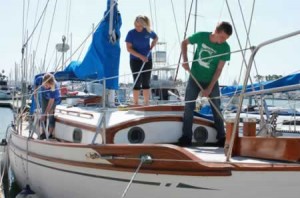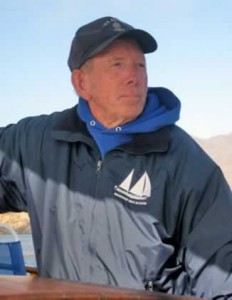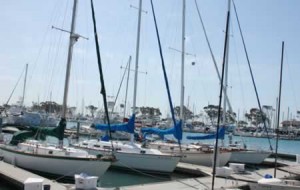
The Sea Scout program, which instills sailing and leadership skills in youth ages 12 to 18, has not ventured beyond Dana Point Harbor since February, anchored by a pending Coast Guard investigation.
Emotions are reaching a crescendo as many in the local boating community see the Coast Guard action as an unnecessary affront to Skipper Jim Wehan’s Ship 936. “It’s just so crazy it makes your head spin,” said Mark Howe, a long time sailing instructor and licensed captain, lobbying on behalf of Wehan’s program.
Similar to a Boy Scout Troop, Ship 936 has provided classroom instruction, Catalina and Channel Island trips and mariner competitions for countless youth, including a number from Laguna, since Wehan founded it 35 years ago as part of the water equivalent arm of the Boy Scouts of America.
The investigation, which will determine if Ship 936 has been operating in violation of the 1993 U.S. Passenger Vessel Safety Act, was sparked by a report from the Coast Guard auxiliary last December of a Sea Scout vessel over-crowded with passengers in formation during the Dana Point Harbor Parade of Lights.
“They did not stop the Sea Scouts from operating,” pointed out U.S. Coast Guard Cmdr. Ryan Manning, who oversees local auxiliary volunteers. “[The auxiliary’s] core mission is boating safety. If they saw anything that they felt was potentially unsafe, which is our primary goal, they would alert us to it.”
Nevertheless, Wehan voluntarily suspended the use of the larger boats after the auxiliary informed him that the Sea Scouts might be operating them as uninspected passenger vessels or UPVs, which are subject to stricter safety regulations than ordinary recreational boats. A Coast Guard legal team at the Alameda sector headquarters is now trying to make that determination.
A UPV differs from an ordinary recreational vessel over what is legally referred to as “consideration” or payment made as a condition of passage. Determining whether a boat is a UPV is “not as clear as one might imagine,” said Manning. “It is kind of a gray area.”

If Sea Scout boats are deemed UPVs, their use in the program could be in jeopardy. The cost of retrofitting the boats for compliance and finding enough licensed captains to man them will put an undue burden on a volunteer program that already runs on a shoestring budget. “Before we were going to change our program to try and meet the requirements of the law, I wanted to make sure the law really applied to us,” said Wehan, who prepared a package outlining Sea Scout operations and submitted it for Coast Guard review.
“We’re glad that he’s being very proactive on the issue,” said Manning, adding that supporting organizations such as Sea Scouts is part of the Coast Guard’s mission. In fact, many former Sea Scouts go on to attend the Coast Guard Academy. The current head of the Sea Scouts nationally is a retired Coast Guard rear admiral.
The Sea Scouts fleet of five donated sailboats in Dana Point ranges from 24 to 38 feet. To keep them in good repair takes an army of volunteers that include scouts, who spend weekends doing routine maintenance to earn credits that they can apply to their yearly dues. It’s those dues and how they are used that is in question.
If the Coast Guard finds that dues are paid in exchange for passage on the large boats, then they will be deemed “consideration” and the boats will be designated UPVs.
 No matter the legal definition, Howe believes the matter should be resolved by common sense. In his view, Sea Scouts are crew, not passengers, and their dues in no way constitute legal “consideration” for sailing aboard Sea Scout boats. “Things that they’ve been calling UPVs have not been UPVs at all,” Howe said.
No matter the legal definition, Howe believes the matter should be resolved by common sense. In his view, Sea Scouts are crew, not passengers, and their dues in no way constitute legal “consideration” for sailing aboard Sea Scout boats. “Things that they’ve been calling UPVs have not been UPVs at all,” Howe said.
Though a ruling is expected at any time, the matter already stained Dana Harbor’s docks with enmity. Some in the boating community suggest some auxiliary volunteers overstepped their authority and no longer can be seen as “a friend of the boater,” said Art Ambrose, the auxiliary’s public education officer. “And I think that’s the tragedy of the whole thing”
The Sea Scouts aren’t alone in being under scrutiny. About 227 vessels in four western states are suspected of unlawfully operating as UPVs and are being reviewed, Manning said.
If the ruling disfavors Ship 936, “I think what we will probably have to do is get rid of the larger boats,” said Wehan. “I’m just keeping my fingers crossed.”





I donated one of the boats in question, and I worked on the boats with Jim Wehan and his volunteers. The amount of work that it takes to maintain the boats is significant and ongoing. That anything could happen to this program, in consideration of Jim Wehan’s dedication and leadership and results, would in my mind be a terrible mistake. The kids that get a chance to participate in Jim’s program are very very lucky, and I know that if Jim had his wish, all local kids would get their chance.